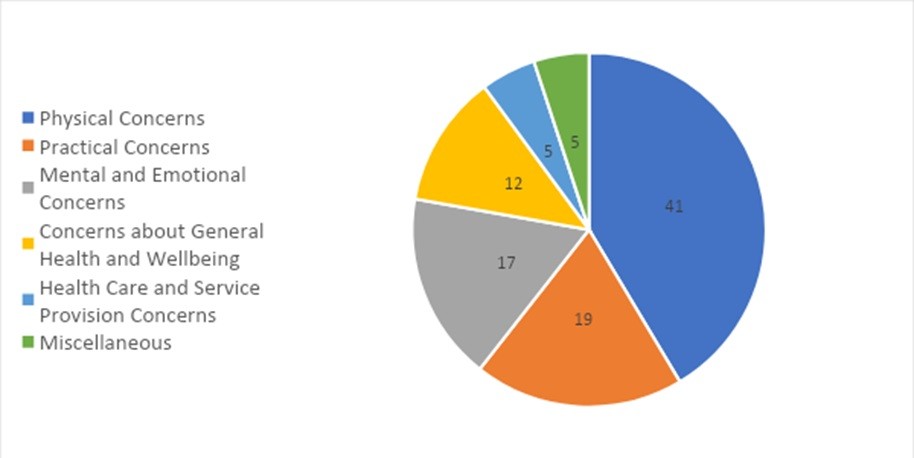NEWS
Implementation and development of MYCaW® frailty framework
Frailty is described by NHS England as 'a loss of resilience that means people don't bounce back quickly after a physical or mental illness, an accident or other stressful event'(1). It affects approximately 10% of people aged over 65 years and 25% of people over 85 years with these figures expected to double by 2045(2).
Gloucestershire Integrated Care System (ICS) has developed several strategies and transformation programmes that inform personalised, proactive models of working with people living with frailty. An integral part of this is capturing the views of patients living with frailty, using MYCaW® so that Gloucestershire ICS can deliver effective, person-centred services.
MYCaW® is an individualised questionnaire designed for evaluating personalised approaches to supporting people. MYCaW® enables a person to state their concerns, and then to assign a score to this concern and score their wellbeing. A follow-up questionnaire enables changes in reported concerns and wellbeing over time to be captured. Also, it allows for wider reflection on other things happening and the impact of the services received.
With funding from NHS Gloucestershire, Meaningful Measures Ltd analysed MYCaW® and frailty data collected between September 2020 to June 2023 and aimed to:
- To confirm the acceptability of using MYCaW® as a core outcome measure within Gloucestershire ICS frailty services to understand what a person most wants support with.
- To develop a MYCaW® concerns framework to enable systematic reporting of personalised data for people living with frailty.
- To investigate how well the frailty services are meeting people's needs and how this may be affected by a persons' level of frailty
Baseline MYCaW® data was collected by operational teams including community matrons during their first or second session with a patient. Follow-up MYCaW® data was collected approximately 3 months later, where possible.
Was MYCaW® an acceptable outcome measure to use?
A short anonymous survey completed by the staff team within the Complex Care@Home Service and South Cotswolds Frailty Service demonstrated that MYCaW® was acceptable and useful in opening conversations. MYCaW® was seen as helpful in understanding what was important to a person and providing rich, relevant personalised data.
"I have found it very useful as a focus on what we are trying to achieve with and for the patient. It will bring a drifting situation back to our original assessment objectives and goals." Community Matron
"It captures a snapshot of what is or is not working for the patient." Occupational Therapist
What were the concerns that people reported they wanted support with?
Analysis of MYCaW® 1625 concerns from 967 people was carried out. The main types of concerns are shown in Figure 1. The largest domain were physical concerns, followed by practical concerns and mental & emotional concerns. For a further breakdown of concerns and frequencies, please read the full report (accessible at the end of this article).
Figure 1. Percentage of concerns in each MYCaW® Frailty coding framework supercategory.
The top 5 individual concern categories reported by people living with frailty are listed in Figure 2. Mobility concerns were the most frequently reported. This was followed by managing the household, activities of daily living and housing. These are key social determinants of health, not health concerns so support given in these areas will likely go on to impact the health and wellbeing of people living with frailty.
Figure 2. Top 5 scoring concerns overall.
Did the frailty service improve people's concerns and wellbeing?
432 people had follow-up data to analyse for score changes in concerns and wellbeing. Sadly 18% of the people from baseline passed away before follow-up data could be collected.
Statistically significant improvements in the mean score changes were achieved (P<0.001) (Figure 3). This demonstrates that people's main concerns and problems are being met by the personalised frailty services and that overall, this is having a positive impact on patients' wellbeing.
Figure 3. Summary of MYCaW® score changes (n=432).
What was important about the frailty service?
MYCaW® asks what a person found most important about the service or support they received. 351/432 people responded to this question.
20% related to the support and understanding provided by the staff in the frailty services as well as the encouragement to make changes or improvements. Patients also appreciated that other members of the family were involved in the conversations with the frailty staff.
"I feel as if you're the only person I can come to for help, you're a lifeline really" SCFS, 100-104yrs, Female, Rockwood 7
16% identified how patients felt genuinely listened to and felt the staff were interested in what was important to the patient. Many patients in this category also appreciated the face-to-face setting.
"That you take the time to listen and are understanding. It's lovely to know the team are there if I need them" SCFS, 80-84yrs, Female, Rockwood, 6
12% percent of patients reported that the most important thing about the service was becoming more mobile, sociable or independent as a result of the support they received.
"You have helped me to realise the importance of staying active and focusing on the positives on what I am managing to do." SCFS, 85-89yrs, Male, Rockwood 5
To read more about the implementation of MYCaW and how it has systematically captured patient voices you can read the full report (below).
References
- National Institute for Health and Care Excellence. (ND). Improving care and support for people with frailty. How NICE resources can support local priorities. [Internet] ND. 2010 [cited 2024 Feb 29]. Available from: https://stpsupport.nice.org.uk/frailty/index.html#:~:text=NHS%20England%20describes%20frailty%20as,accident%20or%20other%20stressful%20event
- 2. Clegg A, Young J, Iliffe S, Rikkert MO, Rockwood K. Frailty in elderly people. The Lancet. 2013 Mar;381(9868):752–62.
When you subscribe to the blog, we will send you an e-mail when there are new updates on the site so you wouldn't miss them.





Comments